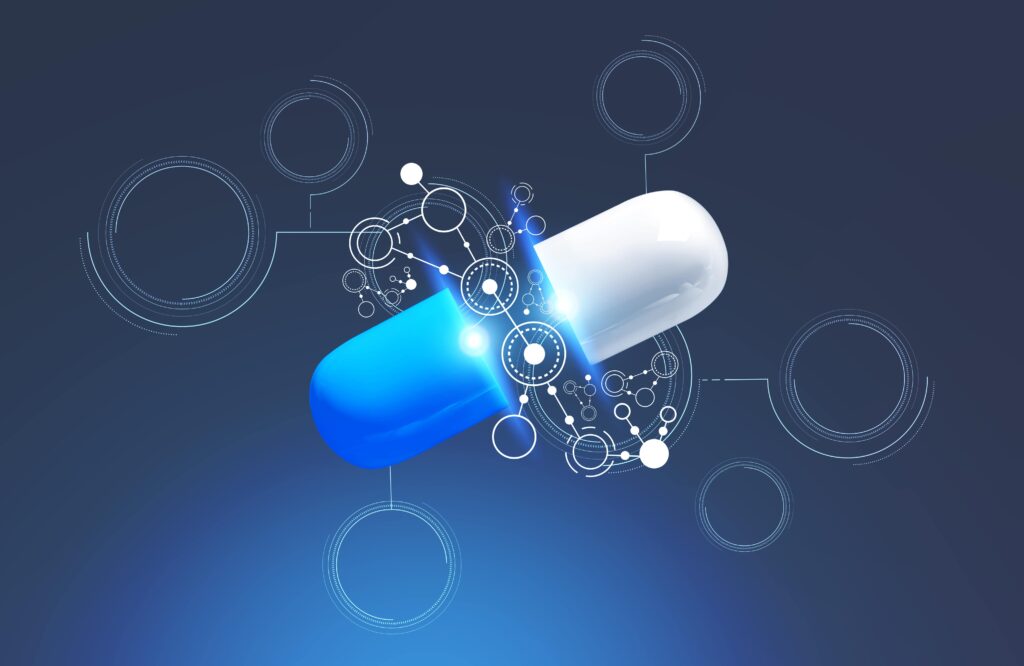Developing a new drug is a lengthy, difficult, and inefficient process. It is characterized by high costs and a substantial failure rate. Only one out of 10 drug candidates make it through clinical trials and are approved for use. To improve these odds, pharmaceutical companies are beginning to leverage artificial intelligence (AI) to design and develop innovative compounds and accelerate the drug discovery process. “In the last couple of years, AI has gone from being hypothetically interesting to real programs moving towards the clinic,” said Bryn Williams-Jones of Benevolent AI. “There’s no shortcuts to drug discovery. We can have better informed ideas, but you still have to go through the rest of the [development] process.”

AI Has Entered the Clinic
Numerous AI-designed drugs are entering clinical trials, with promising preliminary results. For instance, Exscientia’s EXS-21546, a highly selective A2A receptor antagonist, demonstrated positive outcomes in a Phase I trial and has progressed to Phase I/2 trials for patients with specific types of tumors.
Additionally, EXS4318, a small-molecule selective protein kinase C-theta (PKC-θ) inhibitor developed with AI, has been licensed to Bristol Myers Squibb. Exscientia is developing other AI-designed candidates to target therapeutic areas such as COVID-19, tuberculosis, malaria, and rare genetic disorders like hypophosphatasia.
“It’s not just about using generative AI to help us to precision design an exact molecule,” Hopkins says, “but also actually helping us precision design which patients are responders and non-responders.” That is, AI-driven analyses, such as deep multi-omics profiling, would be used to precisely identify the study participants most likely to respond to the drug. This personalized approach enhances the development of drugs tailored to specific patient populations, leading to more effective treatments.
Insilico Medicine has successfully completed phase I trials for INS018_055, an AI-designed drug for idiopathic pulmonary fibrosis. “It’s the first time anyone in our industry has developed a novel target of a molecule, and completed phase one trials, all the way with AI,” said Alex Zhavoronkov, the company’s CEO and founder. Insilico’s rapidly growing pipeline focuses on diseases associated with aging.
Leveraging AI-Fueled Data Analysis
AI is also transforming data analysis in drug discovery. The startup company Recursion employs AI to analyze vast amounts of experimental data and microscopy images. After identifying a gene involved in ovarian cancer, it developed a compound to inhibit its activity, which has shown promise in preclinical studies. The company is also evaluating drugs for rare genetic conditions.
Predicting Protein Structure
In addition to the strides made in drug development, AI and deep learning algorithms such as AlphaFold2 have revolutionized protein structure prediction. These algorithms can accurately determine the three-dimensional structure of proteins, enabling the creation of entirely new proteins for cancer therapeutics and other applications. “It allows us to explore a much broader slot or chemical space than we’d be able to using experimental methods on their own,” reported Don Bergstrom, president of research and development at Relay Therapeutics.
Accelerating Action Against Neglected Diseases
The Drugs for Neglected Diseases Institute in Geneva, Switzerland, uses machine learning to develop better treatments for diseases such as Chagas disease and dengue fever that primarily affect impoverished populations. The institute uses AI to aid in efficient drug repurposing and to accelerate the development of drugs for neglected diseases.
Ongoing Challenges
While AI-driven drug development presents tremendous opportunities, challenges persist. Continuous exploration and refinement are necessary. Nevertheless, the integration of AI into drug development holds promise for transforming the pharmaceutical industry and bringing innovative treatments to market.
Did you enjoy this blog post? Check out our other blog posts as well as related topics on our Webinar page.
QPS is a GLP- and GCP-compliant contract research organization (CRO) delivering the highest grade of discovery, preclinical and clinical drug research development services. Since 1995, it has grown from a tiny bioanalysis shop to a full-service CRO with 1,200+ employees in the U.S., Europe and Asia. Today, QPS offers expanded pharmaceutical contract R&D services with special expertise in neuropharmacology, DMPK, toxicology, bioanalysis, translational medicine and clinical development. An award-winning leader focused on bioanalytics and clinical trials, QPS is known for proven quality standards, technical expertise, a flexible approach to research, client satisfaction and turnkey laboratories and facilities. Through continual enhancements in capacities and resources, QPS stands tall in its commitment to delivering superior quality, skilled performance and trusted service to its valued customers. For more information, visit www.qps.com or email [email protected].





